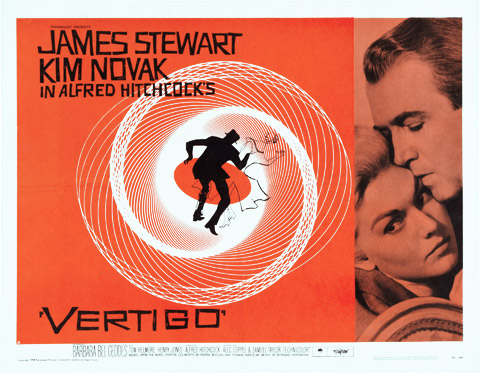
Vertigo (1958)
You may haven’t seen any or very few of his films, but I assure you that you have heard his name before: Alfred Hitchcock.
The British director (with American nationality), is recognized as one of the greatest minds in cinema history as “The Master of Suspense.” With films in his repertoire such as Spellbound (1945), Rear Window (1958), Psycho (1960), that title is more than deserved.
Vertigo (1958) is perhaps the most analyzed and discerned film of the director’s career. We are talking about a first-class psychological thriller, full of mazes and dead roads, a monumental and carefully crafted puzzle that feels like an ethereal journey from beginning to end. The director delved into the thriller genre to transform it with his brilliant psychological readings and constant blasts to the subconscious.
The film tells the story of a man called John ‘Scottie’ Ferguson (James Stewart). He enters into an obsessive spiral for the beautiful Madeleine (Kim Novak), whom he stealthily watches by order of her husband and his friend Galvin Elster (Tom Helmore). Scottie suffered from a serious trauma that led him to develop acrophobia (fear of heights), and subsequently, vertigo (a sensation of whirling and loss of balance, associated particularly with looking down from a great height). Heights and spirals are the demons that constantly stalk him without any mercy.
Vertigo is divided into two parts; the first one embraces the cinema noir in its entirety: Scottie appears with a classic hat and mystery aura, typical of a film noir detective. He elegantly watches every movement of his friend’s wife, this atmosphere is created through a series of beautiful scenes that raise stealth to artistic pedestals.
Scottie watches her around the city, museums and cemeteries, focusing carefully on her emotions and reactions to everything she sees and feels. Later we realize that Madeleine suffers from a strange obsession and melancholy for a mysterious woman named “Carlota Valdez”.
Scottie’s trauma was mainly caused by the death of a partner that he couldn’t help. In this tragic event, the murderer escaped. Therefore, he has an irrational fear of falling, fear of failure and fear of looking down. This leads him to create a false superior idealization, and it seems that Madeleine is perfect for this purpose.
In the second part, Hitchcock begins to generate the discomfort and fear of his unique style. Scottie becomes his own antagonist, and that’s when psychoanalyst Sigmund Freud‘s ‘Pleasure Principle’ (as opposed to the ‘Reality Principle’) theory is projected inside him. This theory mentions that a human being may be attracted to pain if it serves the purpose of immediate satisfaction of biological and psychological needs. Scottie’s suffering becomes what the psychoanalyst calls ‘Death Drive.’ He chooses to take and enjoy the path of suffering, since his emotional trauma has completely taken over him, and he wants to reproduce it in all of its possible ways, this will lead him to become a self-destructive human being that repatedly falls into his fears.
The film also has a contempt on female figures; this is expressed with a deliberate and self-critical purpose. Women take the role of representatives of pain and well-being, of good and evil. Hitchcock lets us know that men are not really in love with women, they are in love with the ideal of superiority that a relationship with a woman brings. Scottie abandons her profession because his fear of heights is greater than his willingness to overcome it. Madeleine is a woman who can´t dominate herself, so she renounces to her identity.
Vertigo proposes several allusions that are widely diverse and debatable, like human beings feeling like a dispossessed figure of themselves, unable to control their own actions. The psychology of the film opens up the statement that human beings are unable to control their destiny, since they are constant victims of external impulses that manifest beyond their control. Hitchcock makes us explore a reality that must be widely analyzed: human beings do not own themselves.
by Octavio Carbajal González

He hated Kim Novak, she had quite a bit to say about him and #metoo
Just finished with your review. Great insight into a film I’ve seen many times times but now feel the need to see it again. And that’s a good thing.
What great movies he has made, and so rich and open to Interpretation. Great review !